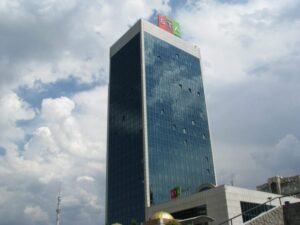
The representative office of Stellantis in Ukraine (the auto brands Peugeot, Citroёn, Opel, DS Automobiles) in 2022 plans to occupy more than 10% of the market of new passenger cars and light commercial vehicles (in 2021 the share was about 10%), including taking into account the brand Jeep, which Stellantis will officially represent in Ukraine from June 1, the press service of the company said.
“The strategic goal for 2022 is to strengthen our position, to “restart” the legendary Jeep brand, to occupy more than 10% of the Ukrainian automotive market,” the company said in a press release.
At the same time, it is clarified that several main areas of work with the Jeep brand and its further development in the Ukrainian market have been outlined: first of all, the development of the dealer network and related services, as well as the restart of four new models.
Also new models of other Stellantis brands will be presented in Ukraine: OPEL Astra, DS 4 and DS 9, Peugeot 308.
“Particular emphasis will be placed on promoting electrified vehicles: electric vehicles and rechargeable hybrids,” the press release says.
According to the press service, in 2021 the total sales of four Stellantis brands in Ukraine exceeded 11,000 units with a market growth of 22% compared to 2020 – up to 116,300 units (including 103,650 passenger cars and 12,700 commercial (LCV) cars.
As reported, in 2020 the share of Stellantis brands was 8.5% of the car market, and this year it was planned to take up to 10.5%.
The leader of Stellantis in Ukraine – the Peugeot brand – in 2021 increased sales by 14% compared to 2020, to 4,930 cars (market share 4.23%).
Citroёn last year increased sales in Ukraine by 56% – to 4,600 units, while more than half of sales fell on commercial vehicles, and the brand became the leader in the light commercial vehicles (LCV) market.

Coal mining enterprises of Ukraine in 2021 increased production of coal by 2% (by 569,500 tonnes) compared to 2020 – to 29.388 million tonnes, according to the data of the Ministry of Energy.
In particular, production of steam coal amounted to 22.153 million tonnes, coking coal – 7.234 million tonnes.
According to the calculations of the Interfax-Ukraine agency, coal mining enterprises, which are part of the ministry’s sphere of management, last year increased production by 1.9 times – up to 5.446 million tonnes, which is largely due to the return from the lease by DTEK of the assets of state enterprise Dobropilliavuhillia.
The mines of Donetsk region in 2021 ensured the production of 11.892 million tonnes of coal (up 5.7% from 2020), Luhansk region – 257,600 tonnes (up 14.2%), Dnipropetrovsk – 16.032 million tonnes (up 0.2%), Lviv – 1.182 million tonnes (down 9.7%), Volyn – 24,400 tonnes (down 28.5%).
In December 2021, production of coal in the country increased by 5.8% compared to the same month in 2020 – to 2.772 million tonnes.

Registrations in Ukraine of new and used electric vehicles in 2021 increased by 18.9% compared to 2020 – up to 8,541 units, while registrations of new cars accounted for 14.2% versus 8.9% a year earlier, the Federation of the Automotive Industry of Ukraine (FAU) reported. “The year ended positively. In December, the number of registrations per month exceeded 900 for the first time, amounting to 928 electric vehicles – twice as many as a year ago, and 8% more than in November,” the report says.
At the same time, the three market leaders remained unchanged – Nissan, Tesla, Chevrolet, which together hold 55% of the market.
According to the above statistics, the leader of registrations Nissan (market share 26.1%) last year showed a slight increase (by 1%, or 26 cars) – up to 2,227 units (for 11 months showed a fall of 1%).
At the same time, Tesla registrations (19.6% of the market) decreased by 16% – to 1,670 units, and Chevrolet (with a 9.4% market share) increased sales by 54% – to 802 units.
“It is interesting that almost all brands have increased sales – except Tesla and Kia. In particular, Audi doubled sales, which allowed it to break into the top ten to the 7th place,” the report says.
In the ranking of brands, after the top three, there are Renault (an increase of 76%, to 551 units), Volkswagen (by 80%, to 550 units), Hyundai (by 43%, to 363 units), Audi (up to 334 units), Mercedes-Benz (up 28%, to 236 units) and Kia (down 13%, to 154 units).
Fiat failed to stay in the top ten, which in 2020 took fourth place, and in 2021 – 12th.

In November 2021, the population of Ukraine paid UAH 16.2 billion for housing and utilities services, which amounted to 69.6% of the amount charged for this period, the State Statistics Service reported.
According to it, the population’s debt for the supply and distribution of natural gas amounted to UAH 29.2 billion at the end of November 2021, for the supply of heat and hot water – UAH 23.3 billion, for the supply and distribution of electricity – UAH 6.9 billion, for centralized water supply and drainage – UAH 6.4 billion, for the management of apartment buildings – UAH 5.6 billion, and for the household waste collection – UAH 1.3 billion.
According to the resolutions of the Cabinet of Ministers of Ukraine dated November 21, 1995 (No. 848) and dated June 27, 2003 (No. 976), in November 2021, some 5,000 agreements were concluded with the population on the repayment of restructured debts for a total of UAH 55.2 million. According to the State Statistics Service, the amount of payments made, taking into account long-term contracts, amounted to UAH 44.4 million.

BTA Bank (Kazakhstan), which owns 20.284% of shares in the National Joint-Stock Insurance Company Oranta (Kyiv), has reduced its block of shares to 0%, according to the information disclosure system of the National Securities and Stock Market Commission.
It is specified that the amount of voting shares of NS-Finance LLC (Kyiv) in Oranta increased to 72.389660% from 50.106890%, and their number – up to 95,718,477 from 66,254,700.
As reported, NS-Finance LLC notified of the conclusion of a sale and purchase agreement on December 13, 2021, as a result of which it became the owner of a controlling stake in Oranta in the amount of 50.0035%. After that, NS-Finance sent a public offer to purchase shares from all holders of the insurer’s shares at UAH 1.05 per share. The purchase of shares on its behalf is carried out by DM BROK LLC (Kharkiv).
According to the National Securities and Stock Market Commission, as of the first quarter of 2021, BTA Bank owned 35.17% of shares in Oranta, the Cypriot companies Visiline Limited – 9.424%, Cezavelios Holdings Ltd. – 5.623%, Chilwell Limited – 9.991%, and another 7.1826% – are held by Maria Loseva.
Oranta is the legal successor of Ukrgosstrakh, founded on November 25, 1921. In 1993, Ukrgosstrakh was reorganized, its founder on the part of the state was the State Property Fund of Ukraine (SPF). In 2007, the SPF sold the last state-owned block of shares to the investor.
The insurer operates on the basis of 33 licenses: 15 compulsory and 18 voluntary types of insurance.

Electricity consumption in Ukraine in 2021, taking into account in-process losses in networks, increased by 5.7% (by 8.391 billion kWh) compared to 2020 – to 154.826 billion kWh, according to the data of the Ministry of Energy.
According to the calculations of the Interfax-Ukraine agency, excluding technological losses, electricity consumption over the past year increased by 6.4% – up to 125.483 billion kWh.
The country’s industry, excluding technological losses, increased electricity consumption by 6% – up to 52.274 billion kWh. Metallurgical industry consumed 28.873 billion kWh (more 6.4% from 2020), fuel – 3.262 billion kWh (more 0.9%), machine building – 3.522 billion kWh (up 11.3%), chemical and petrochemical – 4.349 billion kWh (up 4.6%), food and processing – 4.405 billion kWh (up 1.5%), construction materials – 2.670 billion kWh (up 14.4%), others – 5.194 billion kWh (up 5%).
In addition, agricultural enterprises consumed 3.692 billion kWh (down 2.8%), transport – 6.171 billion kWh (up 8%), construction – 1.064 billion kWh (up 11.2%).
The country’s population last year consumed 38.659 billion kWh (up 5.8%), household consumers – 15.024 billion kWh (up 5.8%), other non-industrial consumers – 8.599 billion kWh (up 16.5%).
The share of industry in the total electricity consumption in 2021 decreased to 41.7% from 41.8%, and the share of the population – to 30.8% from 31%.
In December 2021, electricity consumption, taking into account technological losses, increased by 1.7% compared to the same month of 2020 – to 15.344 billion kWh, excluding technological losses – by 1.7%, to 11.890 billion kWh.